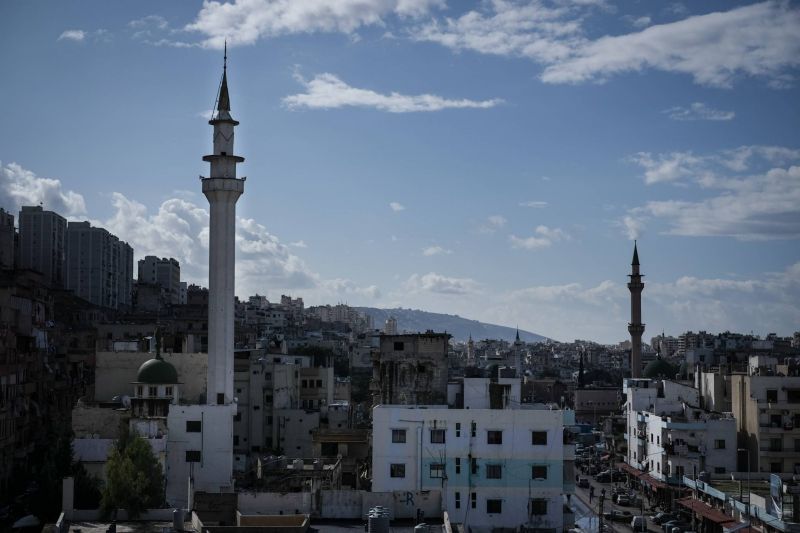
The hilly neighborhood of Jabal Mohsen is seen above the area of Bab al-Tabbaneh, in the city of Tripoli. (Credit: João Sousa/L’Orient Today)
TRIPOLI — In Tripoli’s Bab al-Tabbaneh and Jabal Mohsen neighborhoods, Wednesday’s presidential election in Syria has raised the specter of a return to a time that most residents of the once-warring quarters would prefer to forget.
The normally bustling Syria Street, which divides the two neighborhoods, was nearly empty. A larger-than-usual number of army patrols were making the rounds. Meanwhile, the United Nations advised its staff that missions to north Lebanon would be suspended as of Thursday due to “increasing tension and exchanges of rhetoric between [groups] pro and anti the Syrian regime.”
“Today and yesterday there are people who left their houses, afraid,” 23-year-old Haidar Senna, who lives in Jabal Mohsen but works in Bab al-Tabbaneh as a pigeon keeper, told L’Orient Today. “There are people who went up to their villages and won’t come back for a month, until the situation completely calms down.”
Senna and his parents were preparing to do the same on Wednesday, heading to the village of Haysa, in Akkar, he said.
Periodic clashes between the primarily Sunni area of Bab al-Tabbaneh and the Alawite-majority area of Jabal Mohsen predate the Syrian civil war, but the clashes escalated after 2011 amid deepening divisions over the conflict there.
Some young men from Bab al-Tabbaneh went to fight in Syria with armed groups trying to overthrow the government of President Bashar al-Assad, who is Alawite, while youths from Jabal Mohsen joined pro-Assad forces. The conflict spilled over into their neighborhoods in Lebanon, where warring militias lured young men with few job opportunities by offering them salaries.
Mohammed al-Majid, who owns a car mechanic shop in Bab al-Tabbaneh, said he moved out of the area during that time to protect his wife and young daughter from the violence.
“My house is on Syria Street, between the two areas, and I left because of that,” he said. “Every two months my house would get destroyed.” He was wounded once when he was caught in cross fire between the two sides, he said.
Since 2015, however, calm prevailed, until tensions arose anew over the past month around the Syrian elections.
“A month or two ago, all of the guys from up there would come down and sit in the cafes here, and we would go up there — there was no problem,” Mo'min, a barber from Bab al-Tabbaneh, told L’Orient Today.
Majid agreed: “Before, things were normal. Everything was fine. It’s just for these past two weeks it’s been like this because of the matter of the elections.”
On May 20, Syrian citizens in Lebanon — including some dual Lebanese–Syrian citizens from Jabal Mohsen — descended to the country’s embassy to cast their vote in an election that is all but certain to reinstate Assad for another term.
Scuffles took place throughout the day in different areas of the country between Lebanese groups that oppose Assad and convoys of voters displaying Syrian flags and pro-Assad posters. In Tripoli, a Kataeb Party office and a Lebanese Forces clinic were firebombed after leaders from both parties issued statements calling on any Syrians who voted for Assad to be sent back to Syria.
In Jabal Mohsen, young people took to the streets, burning LF banners alongside Israeli flags, while two people were injured by a grenade thrown from Bab al-Tabbaneh.
Since then, residents of the two neighborhoods said they had heard gunfire at night and that rumors had circulated on social media of further problems to come on Wednesday, Syria’s election day, and on Thursday, when the results are expected to be announced.
A shop owner in Jabal Mohsen who is from Bab al-Tabbaneh told L’Orient Today that if Assad supporters celebrate his victory by firing gunshots into the air, a common local celebratory practice, armed groups from Bab al-Tabbaneh would likely respond by firing back. Still, he said he expects the fallout to be limited as long as no one is killed in the exchange.
“Something will happen for three or four hours — that’s it,” he said. He added: “If someone dies from here or from below, the problems will continue, because people will take revenge.”
Majid, the car mechanic, said he believes residents have little appetite for renewed violence.
“No one wants to see this: people dying, houses being destroyed and people left homeless, sitting without work, and no one looking out for us,” he said.
But he and others acknowledged that personal friendships between the two communities would not necessarily prevent a resurgence of violence.
“The clashes don’t happen because I want it or the other guy wants it,” Mo'min said. “The clashes happen because the politicians, the political leaders — they all profit from it.”
Likewise, Senna said on Wednesday afternoon he is not confident that his friendships in Bab al-Tabbaneh would protect him in the event of a resurgence of violence.
“In an hour I’m going to leave here, because the people are all scared, and if something happens and I’m here, they won’t leave me alone,” he said.
A sheikh from Bab al-Tabbaneh, who asked to remain anonymous, said he believes that political factions have an interest in stirring up conflict.
“Tripoli always serves as a mailbox for political messages to be sent between opposing political forces,” he said. “If it doesn’t happen now, it will happen later. … The politicians are under pressure, and they want something to distract the people with.”